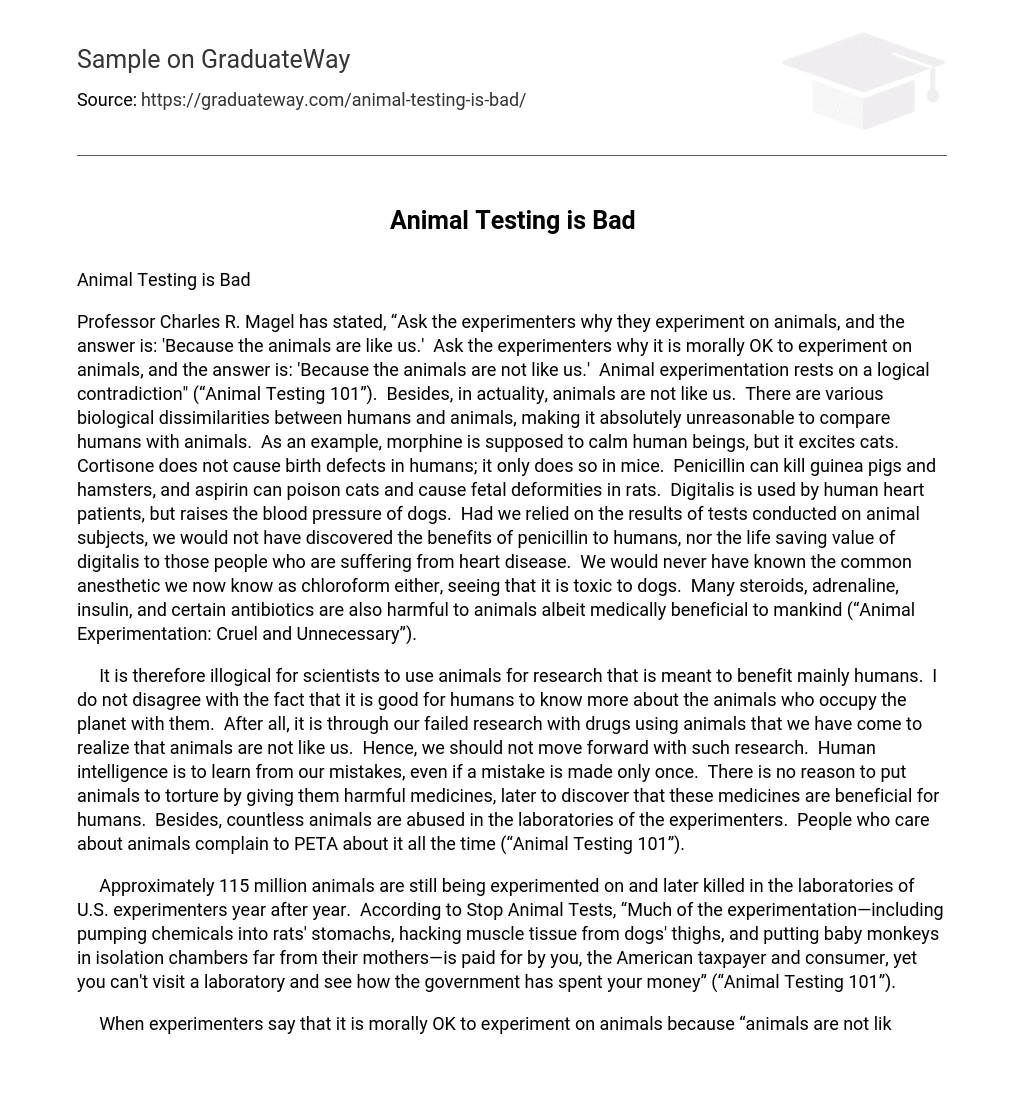Professor Charles R. Magel has stated, “Ask the experimenters why they experiment on animals, and the answer is: ‘Because the animals are like us.’ Ask the experimenters why it is morally OK to experiment on animals, and the answer is: ‘Because the animals are not like us.’ Animal experimentation rests on a logical contradiction” (“Animal Testing 101”). Besides, in actuality, animals are not like us. There are various biological dissimilarities between humans and animals, making it absolutely unreasonable to compare humans with animals. As an example, morphine is supposed to calm human beings, but it excites cats. Cortisone does not cause birth defects in humans; it only does so in mice. Penicillin can kill guinea pigs and hamsters, and aspirin can poison cats and cause fetal deformities in rats. Digitalis is used by human heart patients, but raises the blood pressure of dogs. Had we relied on the results of tests conducted on animal subjects, we would not have discovered the benefits of penicillin to humans, nor the life saving value of digitalis to those people who are suffering from heart disease. We would never have known the common anesthetic we now know as chloroform either, seeing that it is toxic to dogs. Many steroids, adrenaline, insulin, and certain antibiotics are also harmful to animals albeit medically beneficial to mankind (“Animal Experimentation: Cruel and Unnecessary”).
It is therefore illogical for scientists to use animals for research that is meant to benefit mainly humans. I do not disagree with the fact that it is good for humans to know more about the animals who occupy the planet with them. After all, it is through our failed research with drugs using animals that we have come to realize that animals are not like us. Hence, we should not move forward with such research. Human intelligence is to learn from our mistakes, even if a mistake is made only once. There is no reason to put animals to torture by giving them harmful medicines, later to discover that these medicines are beneficial for humans. Besides, countless animals are abused in the laboratories of the experimenters. People who care about animals complain to PETA about it all the time (“Animal Testing 101”).
Approximately 115 million animals are still being experimented on and later killed in the laboratories of U.S. experimenters year after year. According to Stop Animal Tests, “Much of the experimentation—including pumping chemicals into rats’ stomachs, hacking muscle tissue from dogs’ thighs, and putting baby monkeys in isolation chambers far from their mothers—is paid for by you, the American taxpayer and consumer, yet you can’t visit a laboratory and see how the government has spent your money” (“Animal Testing 101”).
When experimenters say that it is morally OK to experiment on animals because “animals are not like us,” I am reminded of the Nazis who took many of their prisoners, the Jews, to be experimented on and then killed. Steven Spielberg’s groundbreaking documentary, The Last Days, provides a real life example of this behavior on the part of the Nazis. As a matter of fact, the Nazis were racists. They were fanatics who did not want the Jews to survive, simply because the Jews were not like them. The fact that today’s experimenters use the same explanation to experiment on and kill the animals makes me want to ask: Would scientists be willing to believe that it is OK to experiment on and kill everyone that is not like us? Is this a logical explanation for racist behavior, or for unnecessary animal killing? Just as different groups of people around the world are killing day by day those who do not appear like themselves – scientists are killing the animals, even though it is morally wrong to do so. After all, animals also have families; they live, breathe, feel pain, and die, just as we do.
Scientists are supposed to be some of the most intelligent people in the world. I believe that they should have understood by now, from past experiences with animal testing, that it is illogical to use animals for tests meant to benefit humans in the long run. I can only imagine how many drugs of benefit to humans scientists may be getting rid of because these drugs do not work on animals in the laboratories. Some of those drugs may cure AIDS or cancer. By finding out that those drugs do not work on animals, scientists may very well be doing away with the idea of such drugs altogether.
In point of fact, scientists had been using rats for cancer research before it was reported in the year 1993 that using rats for cancer research is essentially pointless given that the gene repair system of rats makes them unusually susceptible to cancer. In other words, there are significant differences in the way the genes of rodents and humans are repaired (“Animal Experimentation”). Although this fact is out – I expect that scientists who give in to illogical explanations may continue to use rats for cancer research. To stop the scientists from misusing our valuable resources – finances, in addition to the ecological advantages of animals – I believe that the government should step forward and put an end to animal testing altogether. Animal testing is bad, and there is no reason to argue about it anymore.
Works Cited
1. “Animal Experimentation: Cruel and Unnecessary.” Retrieved from http://members.iinet.net.au/~rabbit/aniexp.htm. (12 March 2007).
2. “Animal Testing 101”. Stop Animal Tests. Retrieved from http://www.stopanimaltests.com/animalTesting101.asp. (12 March 2007).





